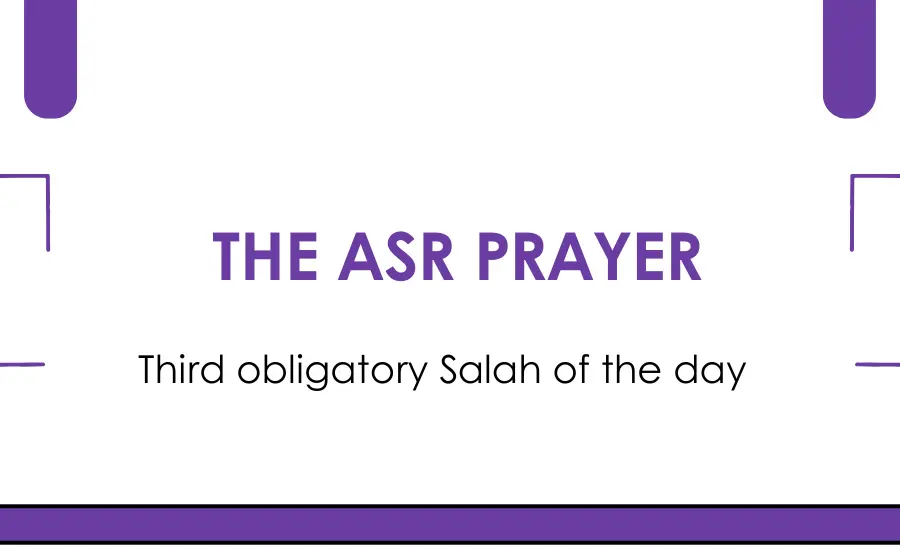The Asr prayer (Salat al-Asr) is the third obligatory namaz of the day, performed in the late afternoon. It marks a spiritual pause between the busy hours of the day and the calm of the evening. In Islam, every prayer has a deep wisdom, and Asr holds special importance as it tests a believer’s consistency and devotion amidst worldly distractions.
The Prophet Muhammad (peace be upon him) emphasized the significance of guarding the Asr prayer, as it is a time when many people are busy with work, trade, or leisure. Performing Asr with sincerity brings immense reward, forgiveness, and spiritual protection.
The Quran commands Muslims to preserve their prayers, especially the middle prayer, which many scholars identify as Salat al-Asr.
Arabic:
حَافِظُوا عَلَى الصَّلَوَاتِ وَالصَّلَاةِ الْوُسْطَىٰ وَقُومُوا لِلَّهِ قَانِتِينَ
Transliteration: Hafizu ala al-salawati was-salatil wusta wa qumu lillahi qanitin
Translation: “Guard strictly the prayers, especially the middle prayer, and stand before Allah with devotion.” – (Surah Al-Baqarah 2:238)
This verse highlights that Asr is the “middle prayer”, standing between the early day and the evening, reminding Muslims to stay connected to Allah throughout all times.
Meaning and Timing of Asr Prayer
The word Asr literally means “time” or “afternoon”, indicating the crucial hours before sunset. It is the third of the five daily prayers and has four obligatory rakats (Fard).
- Start time: When the shadow of an object becomes equal to its length (according to most scholars) or twice its length (according to others).
- End time: Just before sunset, when the Maghrib time begins.
Allah (SWT) swears by Asr in the Quran to emphasize the importance of time and righteous deeds.
Arabic:
وَالْعَصْرِ * إِنَّ الْإِنسَانَ لَفِي خُسْرٍ * إِلَّا الَّذِينَ آمَنُوا وَعَمِلُوا الصَّالِحَاتِ
Transliteration: Wal Asr, inna al-insana lafi khusr, illa alladhina amanu wa amilu as-salihat
Translation: “By time, indeed mankind is in loss, except for those who believe and do righteous deeds.” – (Surah Al-Asr 103:1-3)
This Surah teaches that time is precious and wasting it without faith and good deeds leads to loss, and Asr Salah is a daily reminder of that lesson.
Number of Rakats in Asr Prayer
The Asr prayer is the third obligatory Salah of the day and it consists of a total of 8 rakats, which include 4 Sunnah (Ghair Muakkadah) and 4 Fard (obligatory) rakats. Here’s the breakdown:
- 4 Sunnah (Non-Emphasized / Ghair Muakkadah): Recommended but not obligatory; performing them earns extra reward and reflects love for the Sunnah.
- 4 Fard (Obligatory): Must be performed; missing them intentionally is a grave sin.
Importance of Asr Prayer in Islam
The Asr prayer has a special rank among the five daily prayers. The Prophet (peace be upon him) warned of severe loss for missing it and promised great reward for maintaining it consistently.
Arabic:
مَنْ تَرَكَ صَلاَةَ الْعَصْرِ فَقَدْ حَبِطَ عَمَلُهُ
Transliteration: Man taraka salat al-asr faqad habita amaluhu
Translation: “Whoever misses the Asr prayer, his deeds are nullified.” – (Sahih Bukhari 553)
This hadith shows how critical Asr is and neglecting it carelessly endangers one’s good deeds.
Another narration describes Asr as a moment when angels change shifts, carrying the record of deeds to Allah.
Arabic:
يَجْتَمِعُ فِيكُمْ مَلَائِكَةٌ بِاللَّيْلِ وَمَلَائِكَةٌ بِالنَّهَارِ
Transliteration: Yajtami’u feekum malaikatun billayl wa malaikatun bin-nahar
Translation: “Angels take turns among you, by night and by day, and they meet at the Fajr and Asr prayers.” – (Sahih Bukhari 555)
When one prays Asr properly, the angels report his day’s deeds to Allah in a state of worship.
Combining Dhuhr and Asr Prayers in Islam
Islam is a religion of ease and mercy, and Allah does not burden a believer beyond his or her capacity. While performing each Salah on time is the ideal practice, Islam permits combining Dhuhr and Asr prayers in certain situations, as taught and practiced by the Prophet Muhammad (peace be upon him).
1. The Prophet’s Practice of Combining Prayers
It is authentically reported that the Prophet (PBUH) at times combined Dhuhr and Asr without fear, rain, or travel, to make it easier for his Ummah.
عَنْ ابْنِ عَبَّاسٍ قَالَ: صَلَّى رَسُولُ اللَّهِ صَلَّى اللَّهُ عَلَيْهِ وَسَلَّمَ الظُّهْرَ وَالْعَصْرَ جَمِيعًا، وَالْمَغْرِبَ وَالْعِشَاءَ جَمِيعًا، فِي غَيْرِ خَوْفٍ وَلَا سَفَرٍ
Transliteration: An Ibn Abbas qala: Salla Rasulullah sallallahu alayhi wa sallam adh-dhuhr wal-asr jamian, wal-maghrib wal-isha jamian, fi ghayri khawfin wala safar.
Translation: Ibn Abbas (may Allah be pleased with him) said: “The Messenger of Allah (PBUH) combined Dhuhr and Asr, and Maghrib and Isha, without fear or travel.” – (Sahih Muslim 705)
When asked why the Prophet did this, Ibn Abbas said:
“He wanted to remove hardship from his Ummah.” – (Sahih Muslim 705)
This shows the flexibility of Islam, the Prophet combined prayers at times to make faith practical and sustainable for everyone.
2. Conditions for Combining Dhuhr and Asr
While combining prayers should not become a daily habit, it is allowed under legitimate circumstances such as:
- Traveling (Safar). A Sunnah allowance.
- Severe weather conditions.
- Illness or weakness that makes praying separately difficult.
- Urgent situations or genuine hardship (e.g., exams, surgery, emergencies).
In these cases, a believer may combine:
Dhuhr + Asr → either during Dhuhr time (Jam’ Taqdim) or Asr time (Jam’ Takhir)
This means you can pray both together at either the earlier or later time, depending on what is easier for you.
3. The Spirit of Ease in Islam
Allah reminds us in the Quran of His mercy and understanding toward human limitations:
يُرِيدُ اللَّهُ بِكُمُ الْيُسْرَ وَلَا يُرِيدُ بِكُمُ الْعُسْرَ
Transliteration: Yuridu Allahu bikumul yusr wala yuridu bikumul usr.
Translation: “Allah intends for you ease and does not intend for you hardship.” – (Surah Al-Baqarah 2:185)
Thus, if you are busy, traveling, unwell, or in a situation where praying Dhuhr and Asr separately is not possible, you may combine them, with the sincere intention to maintain your worship and not neglect Salah altogether.
4. Key Reminder
While this is a valid concession, it should be used wisely and not out of laziness or routine. The reward of praying on time is immense, but Allah’s mercy provides flexibility when needed.
“The most beloved deeds to Allah are those performed regularly, even if they are small.” – (Sahih Bukhari 6464)
Virtues and Rewards of Asr Prayer
The Asr Salah brings immense blessings, peace, and spiritual strength. It separates the righteous from the heedless and provides protection from sin and misfortune.
Arabic:
لَنْ يَلِجَ النَّارَ أَحَدٌ صَلَّى قَبْلَ طُلُوعِ الشَّمْسِ وَقَبْلَ غُرُوبِهَا
Transliteration: Lan yalij an-nar ahad salla qabla tuloo’ish shams wa qabla ghuroobiha
Translation: “No one will enter Hell who prays before sunrise and before sunset.” – (Sahih Muslim 634)
This hadith refers to Fajr and Asr, showing that these two prayers are shields from Hellfire.
Additional Virtues Include:
- Being under Allah’s protection for the day.
- Increasing barakah (blessings) in work and time.
- Cleansing the heart from arrogance and worldly attachment.
- Strengthening patience and submission to Allah’s command.
Spiritual and Psychological Benefits of Asr Prayer
Asr prayer has immense psychological and physical benefits in addition to spiritual rewards.
- Mental Reset: It provides a calm pause to reflect and relieve stress accumulated during work hours.
- Improved Focus: Regular Asr prayer helps clear the mind and reestablish spiritual focus before sunset.
- Discipline and Time Management: Scheduling life around Salah brings structure and productivity.
- Mindfulness and Gratitude: It refocuses the believer on divine purpose and gratitude instead of worldly anxiety.
Science also supports that afternoon meditation or prayer lowers cortisol levels, boosts concentration, and improves emotional balance, aligning perfectly with the wisdom of Asr Salah.
Surah Al-Asr: The Connection to Salah
Surah Al-Asr (Chapter 103 of the Quran) is one of the shortest yet most profound chapters in the Quran. It perfectly reflects the spirit of the Asr prayer, reminding believers about the value of time and the importance of righteous action before life’s sunset.
Arabic Text
وَالْعَصْرِ إِنَّ الْإِنسَانَ لَفِي خُسْرٍ إِلَّا الَّذِينَ آمَنُوا وَعَمِلُوا الصَّالِحَاتِ وَتَوَاصَوْا بِالْحَقِّ وَتَوَاصَوْا بِالصَّبْرِ
Transliteration: Wal-Asr. Innal insaana lafee khusr. Illa alladheena aamanu wa amilus-salihaat wa tawasaw bil-haqqi wa tawasaw bis-sabr.
English Translation: “By time! Indeed, mankind is in loss, except for those who believe and do righteous deeds and advise each other to truth and advise each other to patience.” (Surah Al-Asr, 103:1–3)
Meaning and Connection to Asr Prayer
The word “Asr” itself means time that is passing swiftly, a reminder that every moment draws us closer to accountability before Allah. Just as the Asr prayer occurs when the day nears its end, Surah Al-Asr symbolizes the nearing end of life. This surah teaches that salvation lies in four actions:
- Iman (Faith): strengthening one’s belief in Allah through daily Salah, including Asr.
- Amal as-Salih (Good Deeds): living a life guided by worship and righteousness.
- Tawasaw bil-Haqq (Encouraging Truth): standing firm for justice and honesty.
- Tawasaw bis-Sabr (Encouraging Patience): enduring trials with steadfastness and trust in Allah’s plan.
Reflection and Spiritual Insight
Asr prayer beautifully complements this surah’s message, it is a checkpoint of the day where a believer pauses, reflects, and reconnects with purpose. It reminds us that time is our most precious blessing, and wasting it on heedlessness leads to spiritual loss.
The Prophet (PBUH) often recited Surah Al-Asr when meeting or parting with his companions as a reminder of life’s fleeting nature. This shows how deeply its message is tied to the essence of faith and time. Imam Shafi’i (RA) said:
“If people were to ponder over this Surah alone, it would suffice them.” – (Tafsir Ibn Kathir)
Common Mistakes Muslims Make About Asr Prayer
Many Muslims unintentionally fall into mistakes regarding Asr. Some of the most common are:
- Delaying Asr till just before Maghrib, which is disliked and can make the prayer invalid if time runs out.
- Praying hastily without khushu (focus).
- Neglecting the Sunnah before Asr, though not obligatory, it is recommended.
- Missing Asr regularly due to work or study, forgetting that the world should not come before Allah.
The Prophet (peace be upon him) said:
Arabic:
تِلْكَ صَلاَةُ الْمُنَافِقِ، يَجْلِسُ يَرْقُبُ الشَّمْسَ، حَتَّى إِذَا كَانَتْ بَيْنَ قَرْنَىِ الشَّيْطَانِ، قَامَ فَنَقَرَهَا أَرْبَعًا، لاَ يَذْكُرُ اللَّهَ فِيهَا إِلاَّ قَلِيلاً
Transliteration: Tilka salatul munafiq, yajlisu yarqub al-shams, hatta idha kanat bayna qarnay ash-shaytan, qama fanaqaraha arba’an, la yadhkuru Allaha fiha illa qalilan.
Translation: “That is the prayer of the hypocrite; he delays until the sun is between the horns of Satan, then pecks four times quickly, remembering Allah only a little.” – (Sahih Muslim 622)
This warns believers not to delay or rush Asr Salah carelessly.
Virtues of Performing Asr in Congregation (Jama’ah)
Add a short segment on the reward of praying Asr in congregation:
“Whoever prays Al-Bardain (Fajr and Asr) will enter Paradise.” – (Sahih Bukhari 574, Sahih Muslim 635)
This shows that those who protect these two prayers, particularly in congregation, are promised Jannah.
Warning against Praying After Asr
You can add a fiqh note explaining that voluntary (nafl) prayers are not allowed after Asr until sunset, except for those with a valid reason. The Prophet (PBUH) said:
“There is no prayer after Asr until the sun sets.” – (Sahih Bukhari 586)
This clarifies timing boundaries and prevents common mistakes.
Recommended Adhkar and Duas after Asr
After completing Asr, one should engage in dhikr (remembrance) and duas as taught by the Prophet (peace be upon him):
Arabic:
سُبْحَانَ اللَّهِ 33، اَلْحَمْدُ لِلَّهِ 33، اَللَّهُ أَكْبَرُ 34
Transliteration: SubhanAllah 33 times, Alhamdulillah 33 times, Allahu Akbar 34 times.
Translation: “Whoever says SubhanAllah 33 times, Alhamdulillah 33 times, and Allahu Akbar 34 times after every prayer, his sins will be forgiven even if they are like the foam of the sea.” – (Sahih Muslim 597)
You may also recite:
- Ayat al-Kursi (Surah Al-Baqarah 2:255)
- Surah Al-Ikhlas, Al-Falaq, and An-Naas
- Dua for forgiveness: Astaghfirullah (seek Allah’s forgiveness three times)
This regular remembrance brings peace of heart, forgiveness, and spiritual strength after every Salah.
Scientific and Spiritual Wisdom behind Asr
The timing of Asr aligns with the body’s natural circadian rhythm, as the afternoon hours are when the body and mind start to fatigue. Prayer at this time re-energizes the believer.
- Scientifically: The short physical movements during Salah help stretch muscles, improve blood flow, and reduce fatigue.
- Spiritually: It represents renewal, just as the day moves toward sunset, Asr reminds the soul to turn toward Allah before the end of life’s “day.”
Lessons and Reflections from Asr Prayer
The Asr prayer teaches believers the importance of discipline, consistency, and prioritizing faith even in the busiest part of the day. It reminds us that true success lies in balancing worldly duties with spiritual obligations. By protecting the Asr Salah, a Muslim safeguards their faith, earns Allah’s mercy, and strengthens their connection to Him.
- Time is Life: Surah Al-Asr reminds believers that time lost in heedlessness is eternal loss.
- Consistency Matters: The true believer is constant in Salah regardless of the situation.
- Balance between Dunya and Deen: Asr teaches that one can fulfill worldly duties while staying spiritually conscious.
- Reminder of Accountability: Every day’s record is closed at Asr, reminding us to end our day on obedience.
Asr Salah: The Balance between Dunya and Akhirah
The Asr prayer, the third namaz of the day, is a divine reminder of discipline, patience, and gratitude. It separates believers from heedlessness and keeps the heart alive with faith. Praying Asr on time strengthens the bond between the servant and the Creator and ensures that one’s deeds are accepted.
“Indeed, prayer restrains from immorality and wrongdoing.” – (Surah Al-Ankabut 29:45)
So let every believer value the sacred time of Asr, a moment to reconnect, reflect, and realign the heart with Allah’s remembrance.
FAQs about Asr Prayer
What is the Asr prayer time in Islam?
It begins when an object’s shadow equals its length and ends at sunset.
How many rakats are in Asr?
Four Fard (obligatory) rakats, and two or four Sunnah rakats are recommended before it.
What happens if I miss Asr?
It is a major sin to miss Asr deliberately. If missed unintentionally, it should be prayed immediately upon remembering.
Is Asr the middle prayer mentioned in the Quran?
Yes, most scholars agree that the “middle prayer” in Surah Al-Baqarah (2:238) refers to Asr.
Can I pray Asr soon after Duhr?
No, there must be a gap until the Asr time enters. Praying before its time is invalid.






